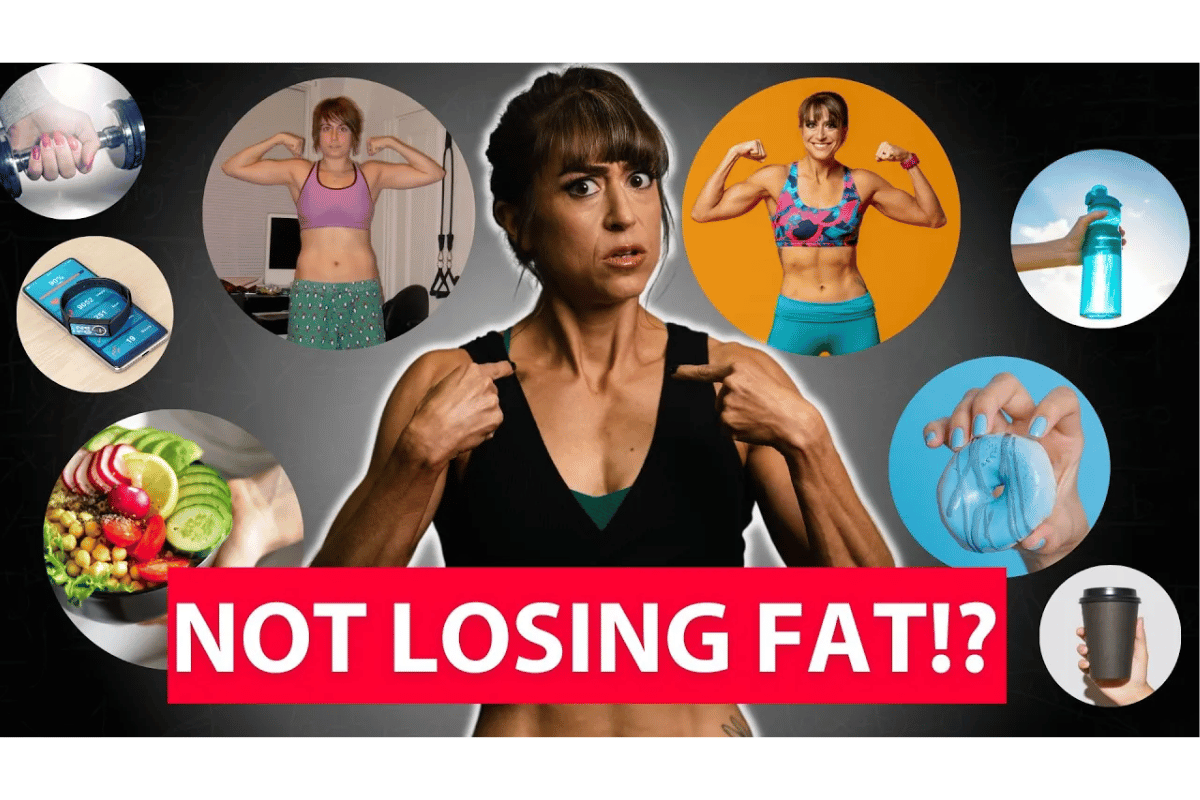In the ever-evolving landscape of health and fitness, it’s imperative to stay up-to-date with the latest breakthroughs. Welcome to “Breaking News in 2024: 7 Effective Ways Women Can Achieve Fat Loss, Not Weight Loss.” This groundbreaking article will unravel the intricacies of fat loss, a concept often misunderstood in the quest for a healthier lifestyle.
In today’s society, where the emphasis on body image and weight is ubiquitous, it’s crucial to differentiate between fat loss and weight loss. While weight loss may involve shedding both fat and muscle, fat loss, as we will explore in this article, is a more nuanced process that focuses on reducing excess body fat while preserving lean muscle mass.
The significance of this distinction cannot be overstated. Achieving fat loss, as opposed to mere weight loss, can lead to improved overall health, enhanced body composition, and a sustainable path to a fitter you. In the following sections, we will delve into the seven effective strategies tailored specifically for women to embark on this transformative journey.

Before we dive into the details, let’s address the fact that these strategies are designed with women in mind. Women often face unique challenges and considerations on their fitness journey, and this article seeks to empower them with the knowledge and tools to succeed in achieving fat loss.
Now, let’s embark on this enlightening journey to discover the seven effective ways that can help women achieve fat loss, not weight loss, in 2024. But remember, it’s not just about the numbers on the scale; it’s about nurturing a healthier and happier you.
Understanding the Difference
To embark on the path of effective fat loss, it’s essential to grasp the fundamental difference between fat loss and weight loss. While these terms are often used interchangeably, they represent distinct aspects of one’s fitness journey.
Fat Loss vs. Weight Loss:
Fat loss is a targeted approach that focuses on reducing excess body fat while preserving or even increasing lean muscle mass. It’s about improving your body composition by shedding the fat that is stored in various areas, such as the abdomen, thighs, and hips. Fat loss is not just about looking better; it’s about optimizing your health and well-being.
Weight loss, on the other hand, simply refers to a reduction in overall body weight, which may include the loss of muscle mass and water weight, in addition to fat. This approach often leads to temporary results and can leave individuals feeling fatigued and less energized.
The Importance of Fat Loss:
Understanding the distinction between these two concepts is vital because prioritizing fat loss over weight loss can have significant benefits. Here’s why:
- Enhanced Health: Excess body fat is associated with various health risks, including heart disease, diabetes, and hypertension. By focusing on fat loss, you address these health concerns at their core.
- Improved Body Composition: Fat loss results in a more toned and defined physique. It helps you achieve the lean and sculpted look that many desire.
- Sustainability: Fat loss is a sustainable approach to fitness. Unlike weight loss, which often leads to yo-yo dieting, fat loss promotes long-term well-being.
Common Misconceptions:
Before we delve into the seven effective strategies for fat loss, let’s dispel some common misconceptions about weight loss:
- Myth: Rapid weight loss is the most effective approach.
- Reality: Quick weight loss often leads to muscle loss and is unsustainable.
- Myth: A calorie-restricted diet is the key to success.
- Reality: While calorie control is essential, the quality of calories matters just as much.
- Myth: Cardio is the best way to lose weight.
- Reality: While cardio is beneficial, combining it with strength training yields superior fat loss results.
In the upcoming sections, we’ll explore how women can harness these insights to achieve fat loss effectively and sustainably. By understanding the difference between fat loss and weight loss, you’re already on the right path towards a healthier and more vibrant future.

The Seven Effective Ways for Women
Now that we’ve established the importance of prioritizing fat loss over weight loss and understanding the difference between the two, let’s dive into the heart of the matter. In this section, we will explore seven highly effective strategies tailored specifically for women to achieve fat loss in 2024.
Strategy 1: Balanced Nutrition
A cornerstone of successful fat loss is maintaining a balanced nutrition plan. This means fueling your body with the right combination of nutrients. Emphasize lean protein sources, as they help preserve muscle mass. Incorporate healthy fats, such as avocados and nuts, which provide sustained energy. Complex carbohydrates, like whole grains and vegetables, supply essential fiber and nutrients.
Strategy 2: Strength Training
Strength training is your ally in the quest for fat loss. It not only builds lean muscle but also increases your resting metabolic rate, making your body more efficient at burning fat. Engaging in resistance exercises two to three times a week can yield significant results.
Strategy 3: High-Intensity Interval Training (HIIT)
High-Intensity Interval Training, or HIIT, is a dynamic and time-efficient workout method. It involves short bursts of intense activity followed by brief rest periods. HIIT workouts elevate your heart rate and boost metabolism, facilitating fat loss. Activities like sprinting, jumping jacks, or cycling can be incorporated into your fitness routine.
Strategy 4: Adequate Sleep and Stress Management
The role of sleep and stress in fat loss should not be underestimated. Poor sleep patterns disrupt hormones that regulate appetite, leading to overeating. Stress triggers the release of cortisol, a hormone that encourages fat storage. Prioritize quality sleep and explore stress management techniques, such as meditation and yoga.
Strategy 5: Hydration and Water Intake
Hydration plays a crucial role in fat loss. Water helps flush toxins from the body, aids digestion, and supports metabolism. Drinking water before meals can also help control appetite. Aim to consume an adequate amount of water throughout the day to optimize your fat loss efforts.
Strategy 6: Mindful Eating
Mindful eating involves being present and attentive to your food. Paying attention to hunger and fullness cues can prevent overeating. Savor each bite, and avoid distractions like screens while eating. This practice fosters a healthier relationship with food and supports fat loss goals.
Strategy 7: Tracking Progress and Adjusting Goals
The final strategy involves tracking your progress and making necessary adjustments. Keep a journal of your nutrition and exercise routines. Monitor your body composition changes rather than just relying on the scale. If you hit a plateau, consider adjusting your workouts or modifying your nutrition plan to continue making progress.
By implementing these seven strategies into your daily routine, you’ll be well on your way to achieving fat loss, not just weight loss. Each strategy complements the others, creating a holistic approach to a healthier and more vibrant you. Stay committed, stay focused, and remember that sustainable fat loss is a journey, not a destination.
Real-Life Success Stories
To truly understand the effectiveness of the strategies outlined above, let’s delve into some real-life success stories of women who have achieved remarkable fat loss transformations by following these principles. These inspiring anecdotes not only showcase the potential of these methods but also demonstrate that sustainable fat loss is within reach for anyone committed to their journey.
Case Study 1: Sarah’s Journey
Sarah, a working mother in her mid-30s, had struggled with weight fluctuations for years. Frustrated by fad diets that provided short-term results but left her feeling deprived and exhausted, she decided to prioritize fat loss over weight loss. Sarah began by adopting a balanced nutrition plan, focusing on whole foods and portion control. She incorporated strength training into her weekly routine and gradually introduced HIIT workouts. The combination of these strategies led to a remarkable transformation. Over the course of six months, Sarah lost 20 pounds of fat, gained lean muscle, and felt more energetic than ever before.
Case Study 2: Emily’s Fitness Odyssey
Emily, a young professional with a busy schedule, knew that quick fixes were not the answer. She embraced the principles of fat loss and started with regular strength training sessions at her local gym. Emily’s commitment to balanced nutrition, hydration, and adequate sleep complemented her workouts. As she began to practice mindful eating, Emily noticed positive changes not only in her physique but also in her overall well-being. Over the course of a year, Emily achieved a sustainable fat loss of 15 pounds, and her confidence soared.
Case Study 3: Maria’s Postpartum Transformation
Maria, a new mother, faced the challenge of shedding post-pregnancy weight while ensuring her body remained strong and healthy. She embraced a holistic approach, focusing on balanced nutrition to provide the nutrients her body needed. Incorporating strength training helped Maria regain her core strength and improve her overall fitness. High-Intensity Interval Training was a game-changer in her routine, as it allowed her to maximize her workout efficiency. With patience and dedication, Maria achieved an incredible fat loss of 18 pounds within a year, while gaining muscle tone.
These real-life success stories illustrate the power of prioritizing fat loss over weight loss and implementing the seven effective strategies outlined in this article. They demonstrate that with dedication, commitment, and a focus on long-term health, women can achieve remarkable transformations that go beyond the numbers on the scale. Remember that your journey is unique, and these stories serve as a source of inspiration and motivation as you embark on your path to fat loss and a healthier, happier you.

Conclusion
In conclusion, “Breaking News in 2024: 7 Effective Ways Women Can Achieve Fat Loss, Not Weight Loss” has unveiled the essential principles for women seeking to transform their bodies and prioritize fat loss. By understanding the crucial distinction between fat loss and weight loss, you’ve taken the first step toward a healthier, more vibrant you.
We’ve explored seven highly effective strategies tailored specifically for women:
- Balanced Nutrition: Embrace a diet rich in lean proteins, healthy fats, and complex carbohydrates for sustained energy and optimal nutrition.
- Strength Training: Build lean muscle to boost metabolism and enhance your body’s ability to burn fat.
- High-Intensity Interval Training (HIIT): Incorporate dynamic workouts that elevate your heart rate and accelerate fat loss.
- Adequate Sleep and Stress Management: Prioritize quality sleep and manage stress to support your fat loss journey.
- Hydration and Water Intake: Stay hydrated to aid digestion, flush toxins, and control appetite.
- Mindful Eating: Cultivate a healthier relationship with food by practicing mindful eating.
- Tracking Progress and Adjusting Goals: Monitor your journey, and be prepared to adjust your strategies for continued success.
As we’ve seen through real-life success stories, these strategies are not just theoretical; they have yielded remarkable results for women committed to their fitness journeys.
Remember that sustainable fat loss is a journey, not a destination. It’s about embracing a healthier and happier lifestyle, rather than chasing quick fixes. By implementing these strategies, you’re on a path to not only shedding excess fat but also improving your overall well-being.
So, as you embark on this transformative journey, keep your focus on fat loss, and let go of the fixation on weight loss. Your body will thank you, and your future self will reap the rewards of your dedication and commitment. Here’s to a healthier, more vibrant you in 2024 and beyond!

FAQ: Achieving Fat Loss, Not Weight Loss
Q1: What’s the difference between fat loss and weight loss?
A1: Fat loss focuses on reducing excess body fat while preserving or increasing lean muscle mass. Weight loss, on the other hand, simply refers to a reduction in overall body weight, which may include muscle and water weight, in addition to fat.
Q2: Why is fat loss more important than weight loss?
A2: Fat loss is more crucial for overall health and body composition because it targets the harmful fat stored in various areas of the body, improving both aesthetics and well-being.
Q3: Can you achieve fat loss without losing muscle mass?
A3: Yes, through strategies like balanced nutrition and strength training, you can prioritize fat loss while preserving lean muscle mass.
Q4: What are the seven effective strategies for women to achieve fat loss?
A4: The seven strategies include balanced nutrition, strength training, High-Intensity Interval Training (HIIT), adequate sleep and stress management, hydration, mindful eating, and tracking progress and adjusting goals.
Q5: Is cardio necessary for fat loss?
A5: While cardio can be beneficial, it’s not the sole factor for fat loss. Combining cardio with strength training and other strategies often yields better results.
Q6: How can I practice mindful eating?
A6: Mindful eating involves being present and attentive while eating, paying attention to hunger and fullness cues, and savoring each bite. It’s about developing a healthier relationship with food.
Q7: How long does it take to see results with these fat loss strategies?
A7: The timeline for results varies from person to person, but with dedication, most individuals can start seeing noticeable changes within a few months.
Q8: Is it possible to achieve fat loss after pregnancy?
A8: Yes, it’s possible to achieve fat loss after pregnancy by embracing a holistic approach that includes balanced nutrition, strength training, and other strategies. Many women have successfully regained their pre-pregnancy fitness levels.
Q9: How can I overcome a fat loss plateau?
A9: If you hit a plateau, consider adjusting your workout routine, modifying your nutrition plan, or seeking guidance from a fitness professional to continue making progress.
Q10: What’s the key takeaway from this article?
A10: The key takeaway is that prioritizing fat loss over weight loss can lead to better health, improved body composition, and sustainable results. The seven strategies outlined here provide a holistic approach to achieving these goals.
fat loss not weight loss